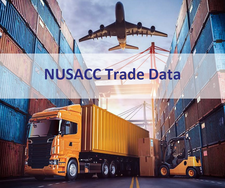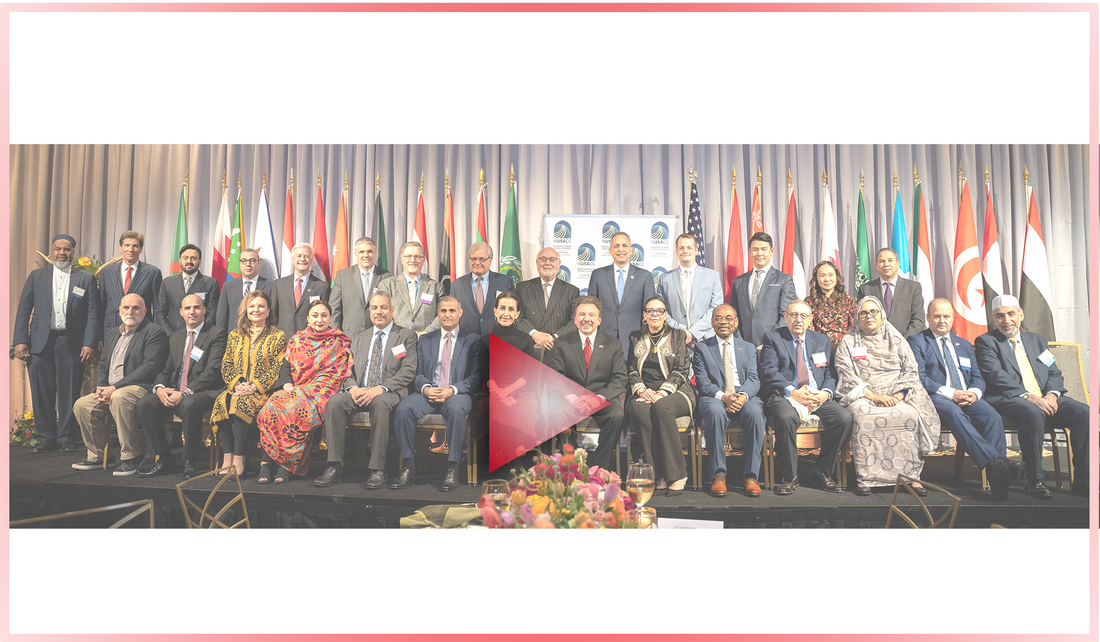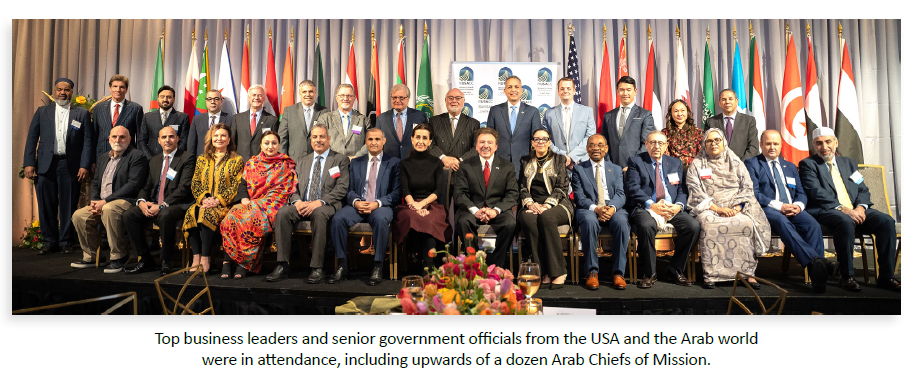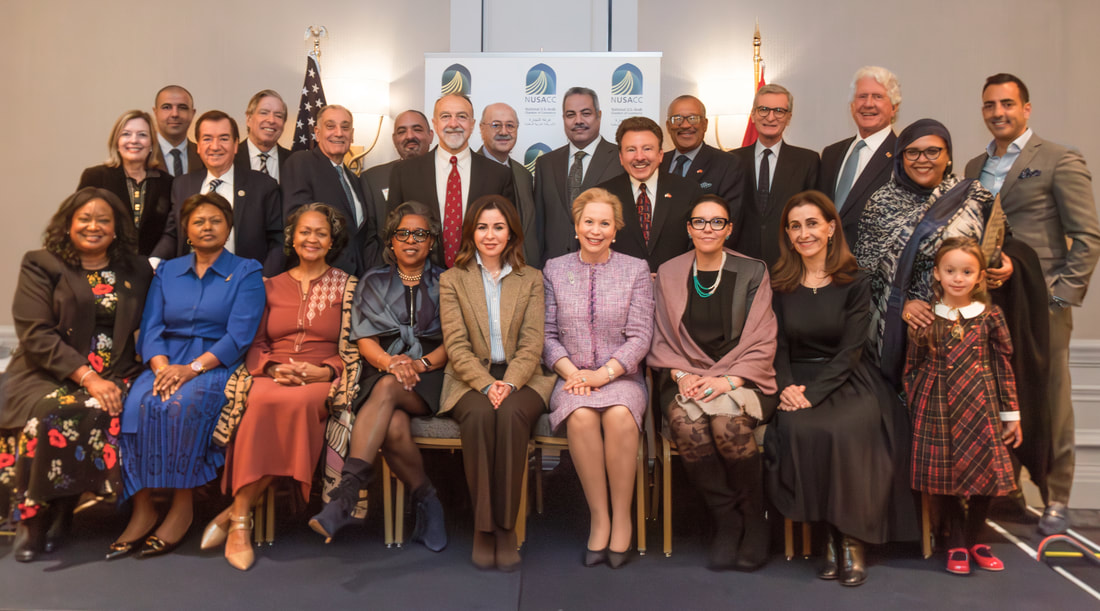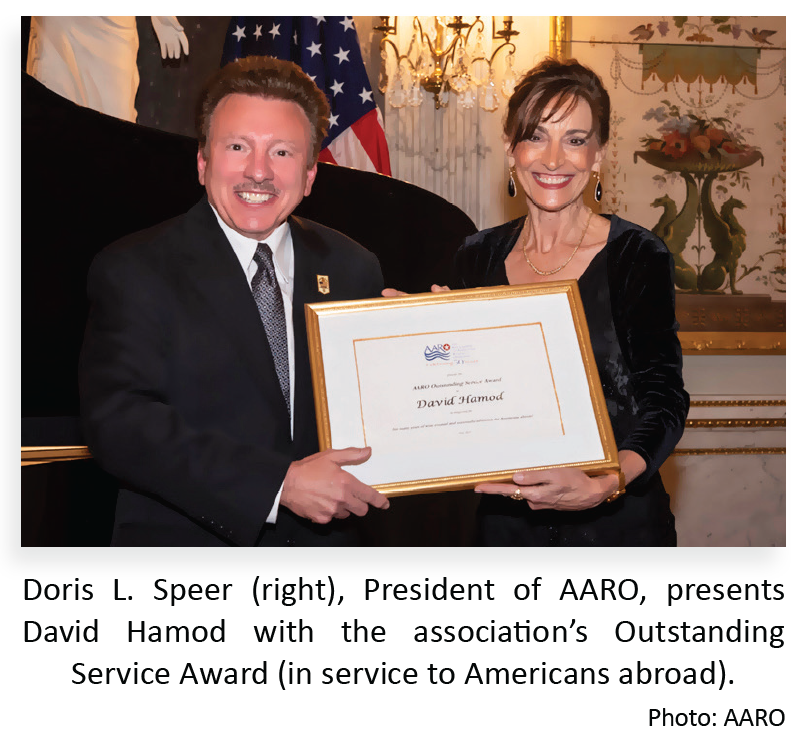Recent Events & NewsU.S. Exports to the Arab World Jump By 12 Percent to $65.3 Billion

According to data released last month by the U.S. Census Bureau, U.S. goods exports to the Arab world jumped 12 percent to $65.3 billion in 2023, marking the first year-on-year increase in U.S. exports to the Middle East and North Africa (MENA) since the COVID era in 2021. The new data were compiled by the National U.S. – Arab Chamber of Commerce (NUSACC), America’s top commercial gateway to the MENA region.
“American exporters are facing certain challenges in the region, tied primarily to supply chain bottlenecks, as well as the continuing tragedy in Gaza,” said David Hamod, NUSACC’s President & CEO. “But on the whole, economic growth in MENA is outweighing such challenges. This is good news for the U.S. export community, which is facing slowdowns in some other parts of the world.” In 2023, the Top Five destinations for U.S. goods exports to MENA were the United Arab Emirates ($24.9 billion), the Kingdom of Saudi Arabia ($13.9 billion), the State of Qatar ($4.7 billion), the Republic of Egypt ($4.5 billion), and the Kingdom of Morocco ($3.8 billion). These five nations accounted for $51.8 billion in U.S. sales, representing approximately 80 percent of American goods exports to the Arab world. To read the full report, please click here. BAHRAIN: Minister of Industry & Commerce Highlights Opportunities
The National U.S. – Arab Chamber of Commerce (NUSACC), America’s top commercial gateway to the Middle East and North Africa (MENA), recently hosted a business roundtable featuring H.E. Abdulla Bin Adel Fakhro, Bahrain’s Minister of Industry and Commerce. More than 30 businesses participated in the discussion, which also included senior officials from the U.S. Government, the Government of Bahrain, and state governments from around the United States.
The roundtable was organized in partnership with the Embassy of the Kingdom of Bahrain and the Bahrain Chamber of Commerce & Industry (BCCI), a “sister chamber” of NUSACC. The gathering was hosted by the law firm of K&L Gates LLP and sponsored by Aluminium Bahrain (Alba), a world-leading aluminum smelter that exports to more than 270 clients around the world. To read the full report, please click here. NUSACC supports Alternative Dispute Resolution (ADR) gathering in Saudi Arabia

Washington DC – The National U.S.-Arab Chamber of Commerce (NUSACC), America’s top commercial gateway to the Middle East and North Africa (MENA), recently helped to sponsor the inaugural Riyadh International Disputes Week (RIDW) in Saudi Arabia. Held under the auspices of the Saudi Center for Commercial Arbitration (SCCA), RIDW 2024 reflected the Kingdom’s commitment to expanding its offerings to the global community that supports commercial Alternative Dispute Resolution (ADR).
An overview of the event may be found here. In the words of Dr. Hamed H. Merah, CEO of the SCCA and the driving force behind the Saudi Center for Commercial Arbitration, “All of us are working diligently to ensure that Saudi Arabia, the MENA region, and beyond continue to be ADR-friendly jurisdictions competing at the highest levels . . . . SCCA believes in the philosophy of continuous learning and drawing insights from many resources, while preserving SCCA’s unique identity.” To read the full report, please click here. NUSACC and Embassy of Bahrain Co-Host GCC Women Entrepreneurs
Washington DC: The Embassy of the Kingdom of Bahrain, in partnership with the National U.S.-Arab Chamber of Commerce (NUSACC) – America’s top commercial gateway to the Middle East and North Africa (MENA) – recently co-hosted a delegation of 20 women entrepreneurs from Bahrain, Saudi Arabia, and the United Arab Emirates.
The high-level dinner for 75 business and government leaders took place at the residence of Bahrain’s Ambassador to the United States, H.E. Abdullah Bin Rashid AlKhalifa. (A short video of the evening’s activities may be found here.) To read the full report, please click here. Oman Business Luncheon Co-Hosted by NUSACC and OCCI
The National U.S. - Arab Chamber of Commerce (NUSACC), America’s top commercial gateway to the Middle East and North Africa (MENA), recently organized a business luncheon on the sidelines of the U.S. - Oman Strategic Dialogue. Luncheon participants included senior officials from the U.S. Government and the Government of Oman, as well as business leaders from across the United States.
The event was co-hosted by NUSACC and the Oman Chamber of Commerce & Industry (OCCI), with sponsorship provided by Occidental Petroleum Corporation, which has been producing in Oman for over 30 years. To read the full report, please click here. "Arab Heritage in the USA" (David Hamod Keynote Speech)
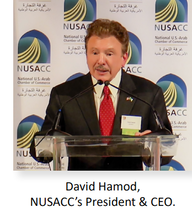
On the occasion of Arab American Heritage Month, NUSACC is pleased to share a recent speech by David Hamod – the Chamber’s President & CEO – entitled “Arab Heritage in the USA.”
A video of the speech may be accessed here, and a hard copy of the speech may be accessed here. Hamod delivered the speech at NUSACC’s annual Iftar dinner, widely regarded as the most elegant Iftar in America. A three-minute video clip of the NUSACC Iftar may be accessed here. For 50 years, NUSACC has served as America’s business gateway to the Middle East and North Africa (MENA). With more than 50,000 stakeholders, NUSACC is the only business entity in the United States that is officially recognized and authorized by the League of Arab States and the Union of Arab Chambers. NUSACC is America’s longest serving organization dedicated to U.S. - Arab business, and it is the only Chamber of its kind to receive the E Award for Export Service from the President of the United States. NUSACC Hosts its Thirteenth Annual Iftar Dinner
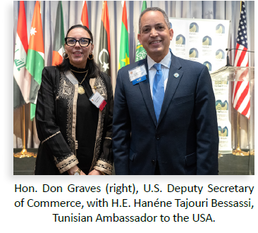
On March 26, the National U.S. – Arab Chamber of Commerce (NUSACC) – America’s #1 business gateway to the Middle East and North Africa (MENA) – hosted its thirteenth annual Iftar dinner in honor of the Arab diplomatic community and the League of Arab States. Senior government officials and business leaders were in attendance, including upwards of a dozen Arab Chiefs of Mission representing the MENA region.
“It was an honor to join the National U.S. - Arab Chamber of Commerce to recognize the diplomats whose vital efforts help ensure our shared prosperity,” said the Honorable Don Graves, U.S. Deputy Secretary of Commerce. “I look forward to continuing to work alongside the diplomatic community and the private sector to shepherd and strengthen our relationships and partnerships in the region.” The NUSACC Iftar, held in partnership with the Washington DC Ritz-Carlton Hotel, has become a Washington tradition. The Embassy of the United Arab Emirates served as Lead Sponsor of this year’s event, supported by nine Gold sponsors: Abaris Capital Advisors, LLC; American Council of Life Insurers; Alsulaiman Group; Assured Communications Advisors; Boeing; The Shafik Gabr Foundation; Islamic Services of America; Kuwait Finance House; Oman Chamber of Commerce & Industry.
To read the full report, please click here. 2023 Ambassador of the Year: H.H. Princess Lalla Joumala Alaoui of Morocco
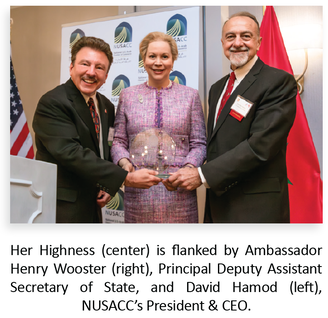
Washington, DC – The National U.S. – Arab Chamber of Commerce (NUSACC) has named H.H. Lalla Joumala Alaoui, the Kingdom of Morocco’s Ambassador to the United States, as the 2023 “Ambassador of the Year.” The award ceremony and luncheon included a “Top 100” list of leaders from business, government, media, and non-governmental organizations. (Click here to see a three-minute video of the event.) The award, now in its 20th year, is given annually to a member of the Arab diplomatic corps in the USA for his or her outstanding contributions to U.S. - Arab commercial relations. “Her Highness has helped to elevate Morocco – U.S. relations during her seven-year tenure as Ambassador here,” said David Hamod, President & CEO of NUSACC. “Her genuine, heartfelt approach has endeared her to a wide variety of communities across the USA, and her commitment to international understanding has helped Americans to gain a greater appreciation for Morocco, one of America’s oldest allies.” To read the full report, please click here. NUSACC’s David Hamod Receives Outstanding Service Award in Paris
“AARO created the Outstanding Service Award 23 years ago to recognize those whose efforts have advanced the rights of overseas Americans,” noted Doris L. Speer, AARO’s President. “David Hamod, who is only the sixth person to receive this award, has dedicated much of his professional life to serving Americans around the globe. AARO is most grateful to him for his unfailing support.”
A copy of Hamod’s acceptance speech may be found here. A video of Hamod’s acceptance speech may be found here. To read the full report, please click here. |
Follow UsLatest Posts |
Join NUSACCMembership is available to companies, institutions, and associations. All employees of member entities enjoy the benefits of membership.
|
Stay InformedStay informed and up to date with the latest information by joining NUSACC's mailing list.
|
REPRESENTATIVE Members and Stakeholders |



